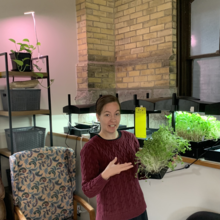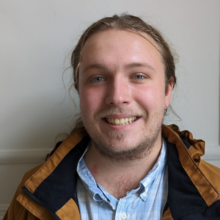Rachel Zehr
BA 2022, English Literature
What began as a minor in History turned into the pursuit of a master’s degree for Rachel Zehr after she discovered her keen interest in early modern history while taking courses at Grebel. Today, Rachel is working towards an MA in History at the University of Waterloo, where she focuses on identity formation in early modern religious communities. 
Last fall, Rachel worked under the supervision of History professor David Neufeld to present an exploration of Erasmus’ Colloquies at the Erasmus Symposium—a virtual collaboration between Mennonite colleges that invited historians to share and engage in discussions on Erasmus. It was through this experience that Rachel was convinced that further studies in History “were not just desired, but necessary.”
“Studying history enriches my experience of this moment in time— this little blip of space that I occupy in the long span of human history,” Rachel explained. Commenting on her research area of early modern religious life, she said “studying this history doesn’t resolve the divisiveness and fracture in the Mennonite communities that I’m in, but it prompts me to attend to those moments where we can lean into difficult conversations and where we can listen to each other well.”
Gwendolyn Friesen
BA 2023, History
Gwen first arrived at the University of Waterloo in 2019 with no intention of studying history—their interests lay in writing and photography. The pandemic led them to take a Grebel history course on a whim which created a bridge between their interests. 
Gwen worked as a photographer for Parks Canada where they captured events, museum exhibits, and re-enactments. “How can I represent the feeling, mood, and tone of this event, illuminate the context, and refine this visual to tell a story?” Gwen would ask, questions derived from their history studies to guide and perfect their photography. Throughout Gwen’s degree, they were able to use their writing and visual work in conjunction with an exploration of historical concepts, leading them to produce a short documentary. They also managed an independent six-month visual collection project inspired by the Mennonite Archives of Ontario.
“Studying history has allowed me to make sense of my world; untangling threads of the past to construct narratives and reckon with the present,” said Gwen. “Grebel faculty were an integral part of this, supporting my academic path, encouraging independent projects, and engaging me in conversation.”
Callum Rempel
BA 2023, History
A long-held interest in world and religious history led Callum to the Grebel campus where he was happily surprised by the opportunity to delve deep into Russian Mennonite history. Not only did Callum’s journey in the History program provide him with interesting work opportunities, it also helped him to better understand his family story. 
Callum is thankful for supportive mentors such as Archivist Laureen Harder-Gissing, who he said, “played major roles in expanding the horizons of my knowledge and interest in Mennonite courses.” Once he decided to engage in Mennonite Studies, the opportunities began flowing in, such as his internship with the Ontario Mennonite Archives of Ontario. What Callum is most proud of, however, is the Sandra Burt Research Award he won last year from the Gender and Social Justice Department for his digital interactive project highlighting sexual violence in Russian Mennonite communities.
“Grebel set me on my path of personal research and to share my love of history with others,” he said, as he aims to now pursue a degree in teaching. “My education has opened many doors, for which I am forever grateful.”






